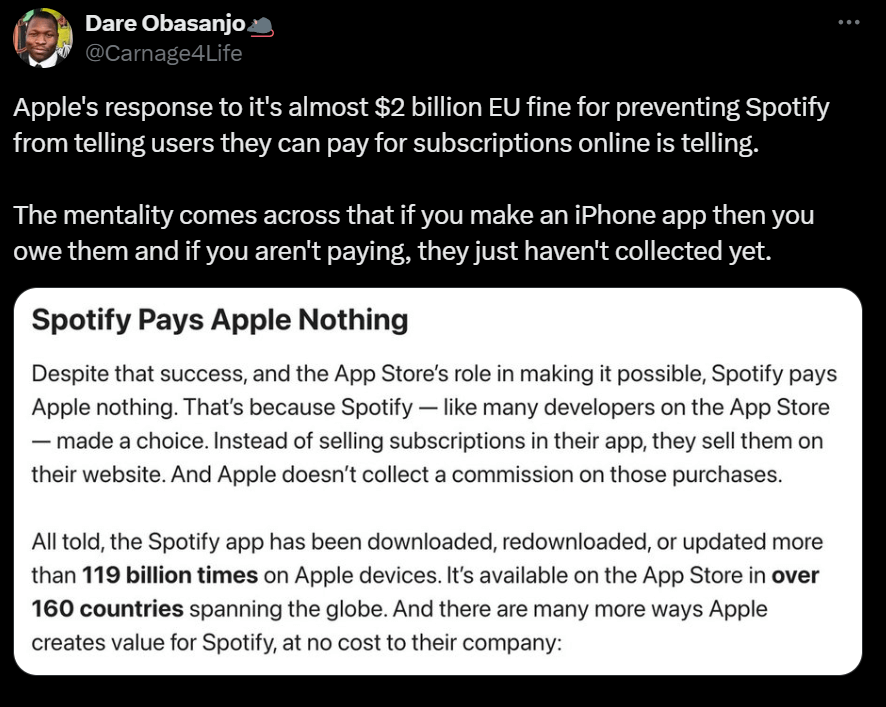
EU slaps Apple with a €1.8 billion fine for monopolizing music app distribution on iOS via the App Store. (Photo by Chris DELMAS/AFP).
Apple slapped with €1.8b fine for App Store music rules
- EU slaps Apple with a €1.8 billion fine for monopolizing music app distribution on iOS via the App Store.
- According to the European Commission, Apple’s anti-steering clauses violate EU trading laws (TFEU Article 102(a)).
- Apple has, inevitably, announced its intention to appeal the decision.
As the age-old adage goes, “There’s a first time for everything,” and tech titan Apple Inc., ranked second among the world’s most valuable companies, being slapped with a whopping €1.84 billion fine by European Union antitrust regulators over its App Store regulations marks an unprecedented twist. It’s a scenario Apple undoubtedly sought to sidestep with all its might (as you would), signaling a pivotal moment in the company’s storied history of navigating regulatory scrutiny.
“For a decade, Apple abused its dominant position in the market for the distribution of music streaming apps through the App Store,” Margrethe Vestager, Executive Vice-President of the European Commission, declared. “It did so by restricting developers from informing consumers about alternative, cheaper music services outside the Apple ecosystem,” she added.
That, according to Vestager, is illegal under EU antitrust rules. “So today we have fined Apple over €1.8 billion,” she concluded on March 4, 2024. The Commission concluded on Monday that the fine of over €1.8 billion is proportionate to Apple’s global revenues and is necessary to achieve deterrence.
A decade-long parade of Apple App Store antics
Apple’s actions may have made iPhone and iPad users pay more for music streaming for nearly ten years. Apple charged developers high fees, causing them to raise prices for users. At the heart of this conflict lies Spotify’s grievance towards Apple, stemming from what it perceives as unfair treatment in Apple’s music streaming policies.
Spotify, the world’s largest music streaming service, has long accused Apple of anti-competitive behavior, particularly regarding its App Store rules. Apple’s requirement for developers to use its in-app payment system is central to Spotify’s complaint. Apple takes a hefty commission of up to 30% on subscriptions and purchases made within the app.

Source: X.com
This commission structure, Spotify argues, puts it at a disadvantage compared to Apple Music, Apple’s streaming service, which does not face the same financial burden. Spotify contends that the high commission fees force it to either raise subscription prices for users who subscribe through the App Store or accept lower margins, undermining its ability to compete effectively.
The feud between Spotify and Apple Music eventually spilled into the regulatory arena, with Spotify filing formal complaints with antitrust authorities in the US and the European Union. These complaints allege that Apple’s conduct violates competition laws and constitutes an abuse of its dominant position in the music streaming market.
For its part, Apple has defended its App Store policies as necessary to ensure a safe and secure user experience and support the platform’s ongoing development and maintenance. The tech giant maintains that its commission fees are standard industry practice and that it applies the same rules to all developers, including its services.
From the European Commission’s point of view, Apple’s anti-steering provisions led to non-monetary harm in the form of a degraded user experience: iOS users either had to engage in a cumbersome search before they found their way to relevant offers outside the app or they never subscribed to any service because they did not find the right one on their own.
The investigation started in June 2020, when the European Commission launched an inquiry into Apple’s App Store regulations affecting app developers. This inquiry intensified in April 2021 when the Commission issued Apple a Statement of Objections, prompting a response from Apple in September of the same year. In a twist, by February 2023, the Commission had replaced the original statement with a revised version, to which Apple responded in May 2023.
The heart of the matter lies in Article 102 of the Treaty on the Functioning of the European Union (TFEU) and Article 54 of the European Economic Area Agreement, which prohibits the abuse of market dominance. While market dominance is not illegal, companies must wield it responsibly, refraining from actions that stifle competition. The upside is that fines levied for antitrust violations flow into the EU’s general budget, easing taxpayers’ burdens.
Despite Brexit, the EU retains jurisdiction over ongoing cases initiated pre-Brexit, with the UK set to receive reimbursement for its share of any fines collected by the EU. “In setting the level of the fine, the Commission considered the duration and gravity of the infringement as well as Apple’s total turnover and market capitalization. It also factored in that Apple submitted incorrect information in the framework of the administrative procedure,” the Commission said.
What will Apple do next?
Apple criticized the EU decision, declaring its intention to challenge it in court. On Monday, the US tech giant swiftly announced its plans to appeal the penalty, marking Brussels’s first antitrust fine ever imposed on the company. “The decision was reached despite the Commission’s failure to uncover any credible evidence of consumer harm, and ignores the realities of a market that is thriving, competitive, and growing fast,” the company said.
Apple argued that Spotify does not pay any commission to Apple because it sells its subscriptions on its website rather than through Apple’s App Store. “The primary advocate for this decision — and the biggest beneficiary — is Spotify, a company based in Stockholm, Sweden. Spotify has the largest music streaming app in the world and has met with the European Commission more than 65 times during this investigation,” it said.
READ MORE
- Data Strategies That Dictate Legacy Overhaul Methods for Established Banks
- Securing Data: A Guide to Navigating Australian Privacy Regulations
- Ethical Threads: Transforming Fashion with Trust and Transparency
- Top 5 Drivers Shaping IT Budgets This Financial Year
- Beyond Connectivity: How Wireless Site Surveys Enhance Tomorrow’s Business Network


